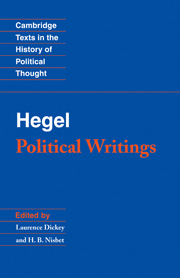Book contents
- Frontmatter
- Contents
- Editors' note
- General introduction
- Chronology of Hegel's life and career
- Translator's preface
- List of abbreviations
- The Texts
- The Magistrates should be Elected by the People (1798)
- The German Constitution (1798–1802)
- On the Scientific Ways of Treating Natural Law, on its Place in Practical Philosophy, and its Relation to the Positive Sciences of Right (1802–1803)
- Inaugural Address, Delivered at the University of Berlin (22 October 1818)
- Address on the Tercentenary of the Submission of the Augsburg Confession (25 June 1830)
- Lectures on the Philosophy of History (1827–1831)
- The Relationship of Religion to the State (1831)
- On the English Reform Bill (1831)
- Editorial notes
- Glossary
- Bibliography of works cited in this edition
- Index of names
- Index of subjects
- Cambridge Texts in the History of Political Thought
The Magistrates should be Elected by the People (1798)
Published online by Cambridge University Press: 05 June 2012
- Frontmatter
- Contents
- Editors' note
- General introduction
- Chronology of Hegel's life and career
- Translator's preface
- List of abbreviations
- The Texts
- The Magistrates should be Elected by the People (1798)
- The German Constitution (1798–1802)
- On the Scientific Ways of Treating Natural Law, on its Place in Practical Philosophy, and its Relation to the Positive Sciences of Right (1802–1803)
- Inaugural Address, Delivered at the University of Berlin (22 October 1818)
- Address on the Tercentenary of the Submission of the Augsburg Confession (25 June 1830)
- Lectures on the Philosophy of History (1827–1831)
- The Relationship of Religion to the State (1831)
- On the English Reform Bill (1831)
- Editorial notes
- Glossary
- Bibliography of works cited in this edition
- Index of names
- Index of subjects
- Cambridge Texts in the History of Political Thought
Summary
[On the recent internal affairs of Württemberg, in particular the inadequacies of the municipal constitution]
(1798)
To the people of Württemberg
It is time that the people of Württemberg ceased to vacillate between hope and fear, to alternate between expectancy and frustrated expectations. I will not say that it is also time for everyone who, in the midst of change or in preserving the old, seeks only his own limited advantage or the advantage of his class [seines Standes] and consults only his own vanity, to renounce these paltry desires, to cast aside these petty concerns, and to fill his soul with concern for the general [good]. For men of nobler aspirations and purer zeal, it is time above all to focus their undirected [unbestimmten] will on those parts of the constitution which are founded on injustice, and to apply their efforts to the necessary change which such parts require.
Peaceful satisfaction with the present [dem Wirklichen], hopelessness, and patient acceptance of an all-too-vast and omnipotent fate have given way to hope, expectation, and courage to face the new. A vision of better, juster times has come to life in the souls of men, and a longing and yearning for a purer and freer destiny has moved all hearts and alienated them from the present reality [der Wirklichkeit]. The urge to break down paltry barriers has fixed its hopes on every event, every glimmering [of change] – even on criminal actions.
- Type
- Chapter
- Information
- Hegel: Political Writings , pp. 1 - 5Publisher: Cambridge University PressPrint publication year: 1999
- 2
- Cited by



